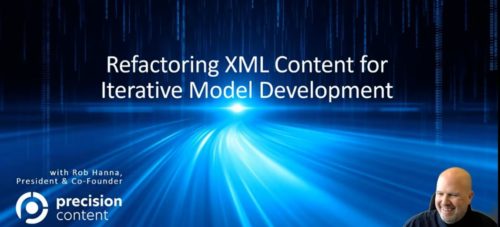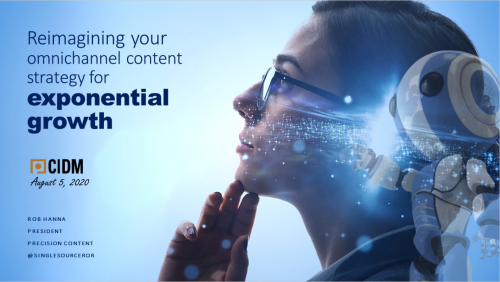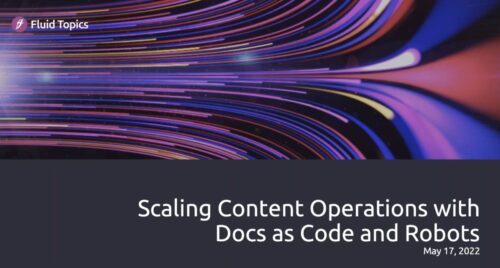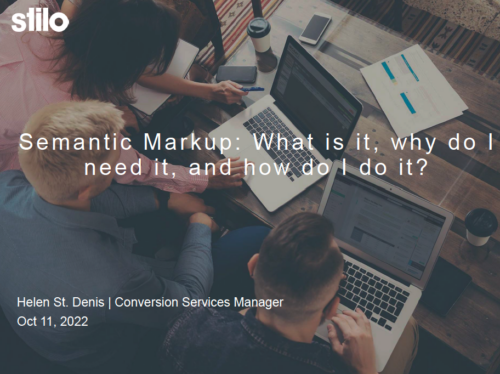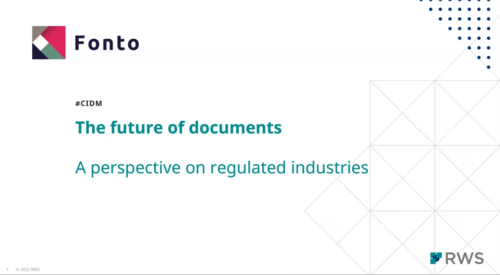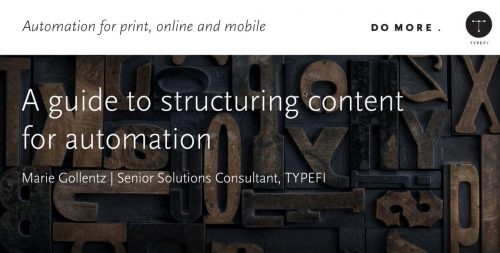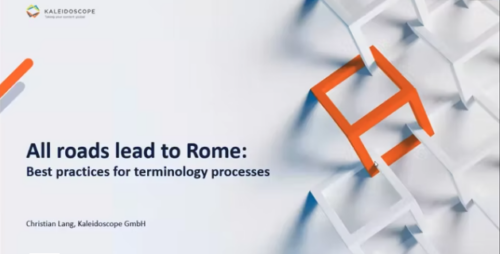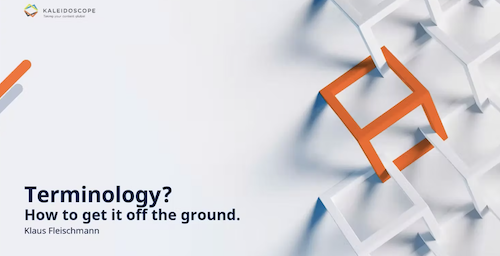-
December 1, 2021 Developing robust content models can never be a once-and-done endeavor where IAs are required to incorporate all aspects into the design prior to authoring. Instead, an iterative approach is needed to allow for incremental improvements not just during setup but long into production. Join Precision Content’s President and Chief Information Architect, Rob Hanna, to explore methods the company uses to refine models and update the content corpus through scheduled refactoring activities. Presented by: Rob Hanna is an award-winning technical writer and content strategist and an industry leading expert in structured XML authoring, DITA, and content management. In 2014, Rob was awarded the rank of Fellow of the Society for Technical Communication (STC) and earned the Enterprise Content Management Specialist (ECMs) designation from AIIM. In 2017, he was named one of the top 25 global leaders in content experience strategy by Mind Touch. He founded Precision Content in 2013 after nearly 20 years in the industry as a technical writer, information architect, knowledge management specialist, and taxonomy expert. In 2018, Precision Content joined Google, Adobe, and Acrolinx on the list of "Top 100 Companies that Matter Most in Digital Content Industry" by EContent Magazine. See http://www.linkedin.com/in/singlesourceror for more information.
-
August 5, 2020 Abstract Business leaders around the globe are looking for ways to replicate the successes of innovative and disruptive organizations like Uber, Amazon, and Spotify that grow exponentially. Rather than adding 10%, they’re looking for 1000%. Exponential growth is deliberate and involves organizations developing capabilities that dramatically outperform the competition. Rob Hanna explores how information-enablement across the enterprise is key to this type of performance and why we need to rethink how we create content to become Exponential Organizations. What you’ll learn
- The definition of “information enablement”
- How your content is tied to your brand’s ability to grow exponentially
- How the 4th Industrial Revolution will impact global businesses, including yours
-
Recorded on April 5, 2023
 Let’s face it: the service technicians’ experience with technical documentation is not at all what you, knowledge and product teams, had expected. The latest Insight-Report Service* highlights the top pain points service teams face in their daily work with product documentation and uncovers sometimes-surprising learnings on what they really miss.
But this is not all bad news! Let’s tackle these issues and explore cutting-edge content strategies, tools, and solutions that can revolutionize the way your service technicians access and use technical documentation. You’ll discover how dynamic content delivery, truly mobile documentation, and AI-driven content recommendations can make a world of difference for your technicians’ productivity and satisfaction.
We will illustrate our point with real-world examples of how organizations have successfully implemented these strategies in record time to the benefit of their entire organization.
Join Christopher Rechtien, Innovation Manager at kothes, and Fabrice Lacroix, CEO of Fluid Topics, as they share practical insights and actionable takeaways to make your technical documentation the most useful and acclaimed resource for your service teams.
*The Insight-Report Service is a survey designed and conducted by kothes GmbH and supported by leading customer service associations in Europe.
Presented by Fabrice Lacroix, CEO of Fluid Topics and Christopher Rechtien, Innovation Manager at kothes
Let’s face it: the service technicians’ experience with technical documentation is not at all what you, knowledge and product teams, had expected. The latest Insight-Report Service* highlights the top pain points service teams face in their daily work with product documentation and uncovers sometimes-surprising learnings on what they really miss.
But this is not all bad news! Let’s tackle these issues and explore cutting-edge content strategies, tools, and solutions that can revolutionize the way your service technicians access and use technical documentation. You’ll discover how dynamic content delivery, truly mobile documentation, and AI-driven content recommendations can make a world of difference for your technicians’ productivity and satisfaction.
We will illustrate our point with real-world examples of how organizations have successfully implemented these strategies in record time to the benefit of their entire organization.
Join Christopher Rechtien, Innovation Manager at kothes, and Fabrice Lacroix, CEO of Fluid Topics, as they share practical insights and actionable takeaways to make your technical documentation the most useful and acclaimed resource for your service teams.
*The Insight-Report Service is a survey designed and conducted by kothes GmbH and supported by leading customer service associations in Europe.
Presented by Fabrice Lacroix, CEO of Fluid Topics and Christopher Rechtien, Innovation Manager at kothes
 Fabrice Lacroix is a serial entrepreneur and a technology pioneer. He has been working for 25 years on the development of innovative solutions around search technology, content enrichment and AI. He is the founder of Fluid Topics, the leading Content Delivery Platform that reinvents how users search, read and interact with technical documentation.
Fabrice Lacroix is a serial entrepreneur and a technology pioneer. He has been working for 25 years on the development of innovative solutions around search technology, content enrichment and AI. He is the founder of Fluid Topics, the leading Content Delivery Platform that reinvents how users search, read and interact with technical documentation. -
Recorded: May 17, 2022
 While product cycles are getting shorter in all industries, down to daily releases for SaaS vendors, technical documentation teams have to keep up with the pace. Information needs to be written faster and delivered in sync.
Join Fabrice Lacroix, CEO and founder of Fluid Topics, and Gaspard Bébié-Valérian, certified technical writer and functional consultant, as they untangle the complex process of continuous content delivery and unveil new methods and processes to embrace the new landscape of documentation. They will share their insights and experience as they explore the collaborative potential between SMEs and tech writers opened by Docs as Code, examine the tooling behind a continuous documentation flow, and showcase the example of a robot writing release notes.
Presented by Fabrice Lacroix & Gaspard Bébié-Valérian:
Fabrice Lacroix is a serial entrepreneur and a technology pioneer. He has been working for 25 years on the development of innovative solutions around search technology, content enrichment and AI. He is the founder of Fluid Topics, the leading Content Delivery Platform that reinvents how users search, read and interact with technical documentation.
At the crossroads of engineering and social sciences, Gaspard enjoys exploring the breadth of technologies involved in technical documentation, including structured documentation, CCMS, and collaborative paradigms like docs as code. Gaspard works as Functional Consultant at Antidot helping clients get the most out of Fluid Topics.
While product cycles are getting shorter in all industries, down to daily releases for SaaS vendors, technical documentation teams have to keep up with the pace. Information needs to be written faster and delivered in sync.
Join Fabrice Lacroix, CEO and founder of Fluid Topics, and Gaspard Bébié-Valérian, certified technical writer and functional consultant, as they untangle the complex process of continuous content delivery and unveil new methods and processes to embrace the new landscape of documentation. They will share their insights and experience as they explore the collaborative potential between SMEs and tech writers opened by Docs as Code, examine the tooling behind a continuous documentation flow, and showcase the example of a robot writing release notes.
Presented by Fabrice Lacroix & Gaspard Bébié-Valérian:
Fabrice Lacroix is a serial entrepreneur and a technology pioneer. He has been working for 25 years on the development of innovative solutions around search technology, content enrichment and AI. He is the founder of Fluid Topics, the leading Content Delivery Platform that reinvents how users search, read and interact with technical documentation.
At the crossroads of engineering and social sciences, Gaspard enjoys exploring the breadth of technologies involved in technical documentation, including structured documentation, CCMS, and collaborative paradigms like docs as code. Gaspard works as Functional Consultant at Antidot helping clients get the most out of Fluid Topics. -
Recorded on October 11, 2022

In the past, we have produced documents with a focus on how they look when published. Page layout, font face, font size, bolding and italics have been useful not just to make the documents attractive, but more importantly, to make them easier to read and understand. Nowadays we are told that semantic markup is preferable. Why is that, and how do we add it to our docs?
Presented by: Helen St. Denis
 Helen joined Stilo as a technical editor. She now works closely with Stilo Migrate customers, helping them to analyze their legacy content and configure appropriate mapping rules. She also provides Migrate customer training and support. Helen has helped Migrate customers to convert millions of pages of content to DITA and custom XML. Helen holds a Bachelor of Arts in English from St. Francis Xavier University in Antigonish, Nova Scotia, and has pursued graduate studies at Queen’s University in Kingston, Ontario. Email: [email protected] LinkedIn: https://www.linkedin.com/in/helen-st-denis-b1b60214/
Helen joined Stilo as a technical editor. She now works closely with Stilo Migrate customers, helping them to analyze their legacy content and configure appropriate mapping rules. She also provides Migrate customer training and support. Helen has helped Migrate customers to convert millions of pages of content to DITA and custom XML. Helen holds a Bachelor of Arts in English from St. Francis Xavier University in Antigonish, Nova Scotia, and has pursued graduate studies at Queen’s University in Kingston, Ontario. Email: [email protected] LinkedIn: https://www.linkedin.com/in/helen-st-denis-b1b60214/ -
Recorded on: August 9, 2023
 Authors, particularly non-technical ones, prefer to work in the familiar environment of MS Office. Office, which has been the de-facto standard for creating hand-edited documents for about three decades now, is a useful tool; however, using the output in any kind of standard environment can be tricky. Converting from Office to PDF is a common function of many applications but there are some aspects to the conversion process which you may not have considered. I will be discussing the pros and cons of various Office conversion processes and going over several use cases for using dedicated conversion software.
Authors, particularly non-technical ones, prefer to work in the familiar environment of MS Office. Office, which has been the de-facto standard for creating hand-edited documents for about three decades now, is a useful tool; however, using the output in any kind of standard environment can be tricky. Converting from Office to PDF is a common function of many applications but there are some aspects to the conversion process which you may not have considered. I will be discussing the pros and cons of various Office conversion processes and going over several use cases for using dedicated conversion software.
Presented by Alex Critchfield
Alex Critchfield is the Support Manager at Antenna House and has been working with automated publishing systems for over two decades.
-
June 3, 2020 In these difficult times, it’s absolutely critical to demonstrate your value to your organization. As a technical communicator, your mission is to make sure you’re getting the right information to the right people. Part of the solution is to find the right tools – but they will only take you so far. Good content is crucial. You must write content in a way that best suits your audience and best matches their search patterns, so they can organically surface the information they need. Join Lawrence Orin, Product Evangelist and Customer Implementation Expert at Zoomin, as he takes an intriguing look at content strategy, and reveals a down-to-earth, practical approach that will ensure your writing is making a visible impact on your company. In it this webinar, you’ll learn:
- Practical steps to improving your writing skills
- Best practices for structuring content
- How to tailor your writing to your audience
-
Recorded on June 15, 2022
 The Future of Documents is shaped by a fundamental change in how information is exchanged. This future sees a shift from traditional 'e-paper', formatted and optimized for reading by humans, towards semantically tagged information - exchanged in an open digital format. In this talk, we will share examples from industries that have a history in structured content - such as publishing and technical documentation - as well as from industries that are ‘newer to the game’, such as pharma and financial services.
The Future of Documents is shaped by a fundamental change in how information is exchanged. This future sees a shift from traditional 'e-paper', formatted and optimized for reading by humans, towards semantically tagged information - exchanged in an open digital format. In this talk, we will share examples from industries that have a history in structured content - such as publishing and technical documentation - as well as from industries that are ‘newer to the game’, such as pharma and financial services.
- The Future of documents, - structured content and semantics from niche to mainstream
- Define Structured Content. What is it, and why is it so fundamentally different from formatted documents?
- What drives organizations to move from traditional authoring towards structured content authoring
- How can industries learn from each other? – Discussing benefits and features.
- Content automation
- Documents as data
- Component based authoring
- Future of documents
 Jan Benedictus is Founder and Managing Director of Fonto. His experience goes back to the late 1990's when he started working in the field of online and digital publishing. In 2014, he started Fonto - with the mission to make structured content authoring available for everyone.
Fonto, now part of RWS, is the leading provider of user-friendly tools for structured content creation, editing and review. Jan is a regular speaker on the subject of The Future of Documents; sharing Fonto's experiences and insights from working with structured content in various industries.
Jan Benedictus is Founder and Managing Director of Fonto. His experience goes back to the late 1990's when he started working in the field of online and digital publishing. In 2014, he started Fonto - with the mission to make structured content authoring available for everyone.
Fonto, now part of RWS, is the leading provider of user-friendly tools for structured content creation, editing and review. Jan is a regular speaker on the subject of The Future of Documents; sharing Fonto's experiences and insights from working with structured content in various industries.
-
September 9, 2020 This is a presentation that provides an intersection between content and design. It is a high-level practical guide to analyzing your content, deciding what you want to do with it, developing style naming conventions, and developing editorial style guides, design style guides, and style templates. Once you get to that stage, you can then consider how content management systems, automation, and xml might fit into your publishing processes. Presented by: Marie Gollentz is a Senior Solutions Consultant focusing on the European market. Prior to joining Typefi, she held a number of positions in the publishing industry in London, including at the publisher of Research Fortnight and the London School of Business and Finance. Marie holds a Masters degree in European Political Sciences from the Autonomous University of Barcelona and a Bachelor’s degree in Political Sciences from Sciences Po Strasbourg. She is trilingual in English, French and Spanish.
-
Recorded on December 7, 2023

Communication can be tricky as meaning and understanding can get lost easily. The nuances of our languages with their different meanings and overlapping concepts are only one source for failed communication. On a business level, things get even more complicated when different business units or content providers are not consistent in their usage of words. In the days of “King Content” this can be detrimental to your business success.
- But how do you find out which terms are used in various parts of your organization?
- How can you gather and harmonize them?
- How can you get everybody's input on the suggestions you make as a terminologist?
- And how can you make sure you have a functioning feedback loop to maintain consistently high termbase quality?
Find out more in our webinar where we present procedural and technological solutions with our Content Quality Platform Kalcium.
Presented by Klaus Fleischmann, Kaleidoscope
Klaus Fleischmann studied translation and IT in Vienna, holds an MA in Conference Interpreting from Monterey, California, and a MAS in Technical Communication from Krems, Austria. In 1996, he founded Austria-based Kaleidoscope, a company implementing content, translation, and terminology management processes for internationally active companies. Kaleidoscope develops online collaboration software for enterprise-level terminology workflow, translator query management, in-country review etc., making the translation quality process comprehensible and strategically manageable. In 2007, he became CEO of Austria's leading LSP, Eurocom Translation Services. Always active in the industry, Klaus was voted into the Gala Board of Directors in 2015 and 2017.
-
Recorded: June 9, 2022
 Terminology only works effectively if the organization manages to agree on consistent concepts and terms. But to achieve a company-wide understanding and agreement a well thought out process and regular interaction are needed. While some organizations prefer a systematic process, others react to ad hoc requests, some are happy with a combination of both.
Therefore, we
Terminology only works effectively if the organization manages to agree on consistent concepts and terms. But to achieve a company-wide understanding and agreement a well thought out process and regular interaction are needed. While some organizations prefer a systematic process, others react to ad hoc requests, some are happy with a combination of both.
Therefore, we
- look at the advantages and disadvantages of both approaches and
- share how to set them up in practice
 Christian Lang, Technical Consultant, has a wide range of experience and interests in the language field, proven by his degree in Japanese studies and translation. He first became involved with terminology management as a freelance translator for the European Patent Office. Since then, it has become one of his hobbies, as has research in the field of NLP on topics such as machine translation, automatic term extraction, and concept maps.
Christian Lang, Technical Consultant, has a wide range of experience and interests in the language field, proven by his degree in Japanese studies and translation. He first became involved with terminology management as a freelance translator for the European Patent Office. Since then, it has become one of his hobbies, as has research in the field of NLP on topics such as machine translation, automatic term extraction, and concept maps.
-
Recorded: April 27, 2022
 Presented by Klaus Fleischmann
OK, so we have all understood that terminology is important for content, AI, search engines, consistent naming, etc.
But what do you need to do
Presented by Klaus Fleischmann
OK, so we have all understood that terminology is important for content, AI, search engines, consistent naming, etc.
But what do you need to do
- to launch a professional and scalable terminology process,
- to convince your boss and your peers that your company needs it and
- to get this off the ground quickly and efficiently with the help of modern terminology software?

